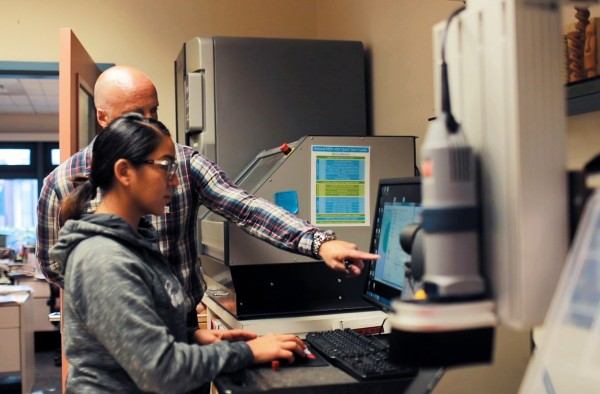 Search
MiraCosta
Search
MiraCosta
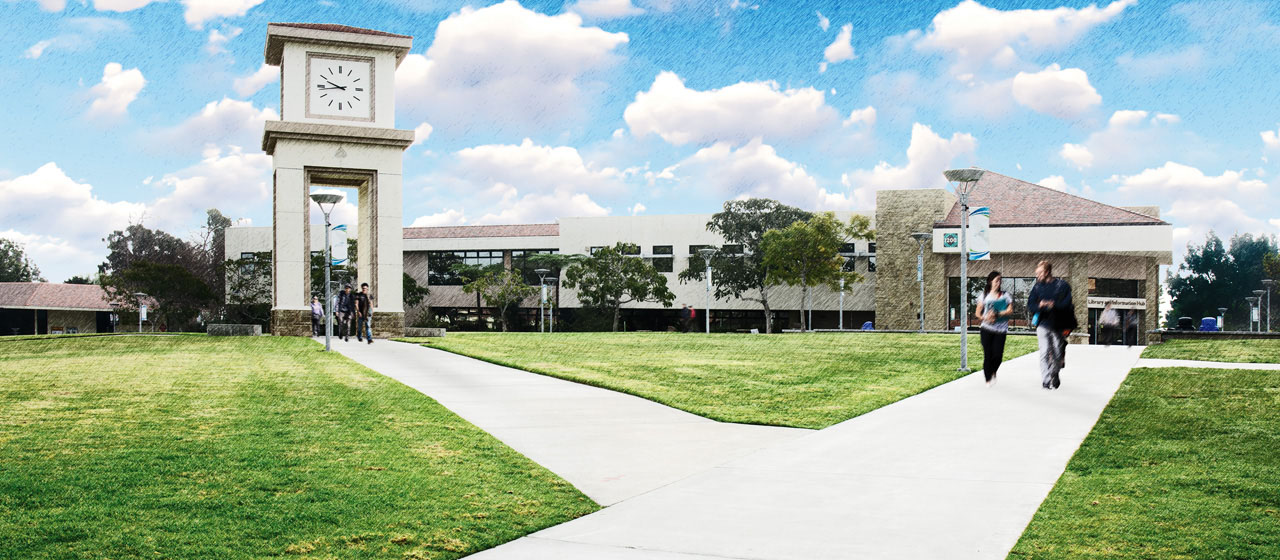
Design
Design
How to Read Course Descriptions
For more detailed information about a course, such as its content, objectives, and fulfillment of a degree, certificate, or general education requirement, please see the official course outline of record, available on the Courses and Programs webpage at https://www.miracosta.edu/governance/courses-and-programs-committee/curriculum-management-system.html.
Courses
DESN 100: Fundamentals of Design
Units: 3
Prerequisites: None
Acceptable for Credit: CSU, UC
Lecture 2 hours, laboratory 3 hours.
Course Typically Offered: Fall, Spring
This course introduces the fundamentals of the design process as students develop and apply design skills using visual elements and principles of two- and three-dimensional design. It includes solving visual problems and creating authentic designs using black and white and color media in both two- and three-dimensions. Students also study design in historical, social, and multicultural contexts.
DESN 101: Computer-Aided Design and Drafting
Units: 4
Prerequisites: None
Acceptable for Credit: CSU, UC
Lecture 2 hours, laboratory 6 hours.
Course Typically Offered: Fall, Spring, and Summer
This course introduces students to the fundamentals of computer graphics and two and three-dimensional modeling on computer-aided design and drafting systems. Students use AutoCAD and other software and online computer systems to design and display various objects. Students learn principles and techniques that enable them to create, modify, annotate, scale, and output two- and three-dimensional drawings, renderings, and models.
DESN 102: Architectural Drawing
Units: 3
Prerequisites: None
Acceptable for Credit: CSU, UC
Lecture 2 hours, laboratory 3 hours.
Course Typically Offered: Fall, Spring
This course provides the methods and techniques required for architectural drawing. It covers freehand sketching, line work, lettering, geometric constructions, orthographic and isometric projections, and construction drawings, which include floor plans, elevations, sections, and details.
DESN 103: Architectural Communications
Units: 3
Prerequisites: None
Advisory: DESN 102
Acceptable for Credit: CSU, UC
Lecture 2 hours, laboratory 3 hours.
Course Typically Offered: Fall
This course provides students the fundamentals of architectural presentation, rendering, and model making. It introduces standards and applications of design language, color theory, pen and ink, freehand drawing, two-point perspective, and model making technique.
DESN 105: Construction Materials
Units: 3
Prerequisites: None
Acceptable for Credit: CSU, UC
Lecture 2.50 hours, laboratory 1.50 hours.
Course Typically Offered: Summer
This course provides an overview of the processes and materials used in construction. Topics include elements of planning, designing, and contracting of the work. The course emphasizes site preparation and the materials used in residential and commercial projects, including wood, concrete, steel, glazing, and masonry as applied to the interiors and exteriors of buildings.
DESN 107: History of Western Architecture-A Sustainable Perspective
Units: 3
Prerequisites: None
Acceptable for Credit: CSU, UC
Lecture 3 hours.
Course Typically Offered: Fall, Spring, and Summer
This course introduces the history of Western architecture from the ancient Near East to the present day with an emphasis on the timeless principles of sustainable design. It examines selected significant historical works of architecture to shed light on the technological, religious, and social forces that shaped these works. Students are introduced to important buildings as they examine past exemplars of architectural design through the lens of present day sustainability guidelines.
DESN 108: World Architecture
Units: 3
Prerequisites: None
Acceptable for Credit: CSU, UC
Lecture 3 hours.
Course Typically Offered: Fall, Spring
This survey of non-Western architectural history examines how non-Western building traditions evolved during and after Western and Islamic colonialism. The course focuses on the cultural conditions and forces that shaped the indigenous architecture of the pre-Columbian Americas, the Islamic empires, and India, China, South-East Asia, and Japan.
DESN 109: Introduction to Engineering and Design
Units: 1
Prerequisites: None
Acceptable for Credit: CSU, UC
Lecture 0.50 hour, laboratory 1.50 hours.
Course Typically Offered: Fall or Spring
This course introduces students to engineering and design. Students learn about engineering as a field of study and profession. Through tours, guest speakers, text reading, and group discussions, students learn about the campus resources, organizations, academic planning, time management, and study skills necessary for success in engineering. Students develop a plan to achieve their own academic, personal, and professional goals as well as an understanding of design through a project- and team-based learning experience.
DESN 110: Graphics Communication
Units: 3
Prerequisites: None
Acceptable for Credit: CSU, UC
Lecture 2 hours, laboratory 3 hours.
Course Typically Offered: Fall or Spring
This course introduces graphics as a fundamental means of communicating technical information for product design, manufacturing, and construction. Students develop an understanding of graphics communication in the design process and gain hands-on experience using computer-aided design software to produce models, assemblies, and drawings according to industry standards.
DESN 111: Engineering Design Graphics
Units: 4
Prerequisites: None
Advisory: DESN 101 or DESN 110
Acceptable for Credit: CSU, UC
Lecture 3 hours, laboratory 3 hours.
Course Typically Offered: Spring
This course prepares engineering and design students to use the graphic communication tools used by engineers in industry. Students develop an advanced understanding of these tools in the engineering design process and gain hands-on experience using modern computer-aided solid modeling software to produce complex part models, assemblies, and drawings.
DESN 120: Manufacturing Processes
Units: 3
Prerequisites: None
Acceptable for Credit: CSU
Lecture 2.50 hours, laboratory 1.50 hours.
Course Typically Offered: Fall
This course provides students a basic understanding of the properties of materials and how these materials, including plastics, metals, ceramics, and composites, are transformed into finished products. Students study basic and advanced manufacturing processes, including material removal, joining, assembly, casting, surfacing, and finishing. Other topics include numerical control, rapid prototyping, measurement and gaging, geometric dimensions and tolerancing, and statistical methods
DESN 200: Architectural Design I
Units: 3
Prerequisites: DESN 102.
Enrollment Limitation: Concurrent enrollment in DESN 102 if prerequisite not met.
Acceptable for Credit: CSU, UC
Lecture 2 hours, laboratory 3 hours.
Course Typically Offered: Spring
This course introduces the basics of architectural design. Students learn and apply fundamental form and space concepts to a design project using visual communication, spatial communications, and creative problem solving.
DESN 201: Advanced AutoCAD Computer-Aided Design and Drafting
Units: 3
Prerequisites: DESN 101.
Enrollment Limitation: Concurrent enrollment in DESN 101 if prerequisite not met.
Acceptable for Credit: CSU
Lecture 2 hours, laboratory 3 hours.
Course Typically Offered: Spring
This course focuses on applying advanced AutoCAD skills in the design process to create models, drawings, and related documentation for a variety of applications and industries. Topics include blocks, attributes, external references, solid, mesh, and surface modeling, presentation, and photorealistic rendering. Students develop and apply skills in visualizing, creating, and editing 3D shapes for modeling, testing, rapid prototyping, and marketing. The course emphasizes improving productivity and developing modeling and presentation skills.
DESN 203: Solid Modeling
Units: 3
Prerequisites: None
Advisory: DESN 101 and DESN 110.
Acceptable for Credit: CSU, UC
Lecture 1.50 hours, laboratory 4.50 hours.
Course Typically Offered: Fall, Spring
This course introduces engineering and design students to 3D parametric solid modeling, including basic and intermediate parts, assemblies, and drawings. From their models, students produce CAD drawings to include orthographic, pictorial, section, and detail views. The course also covers dimensioning, dimensional tolerancing, and thread notation per ASME Y14.5M-1994 and uses Pro/Engineer (Creo) and SolidWorks software extensively.
DESN 204: Modeling, Prototyping, and Manufacturing
Units: 3
Prerequisites: None
Advisory: DESN 203 or DESN 201
Acceptable for Credit: CSU, UC
Lecture 2 hours, laboratory 3 hours.
Course Typically Offered: Fall
This course provides theory and hands-on application of the design process, 3D modeling, prototyping, and manufacturing to students with prior modeling experience or coursework. Building upon drafting fundamentals, students develop skill in computer-aided solid modeling, additive manufacturing, and conventional machining processes. Students develop and refine modeling skills, produce prototypes, enhance presentation models, and use simulation and 3D printing tools to solve design problems individually and in teams. Additional topics include problem identification, concept generation, project management, risk reduction, file translation, virtual/augmented reality (VR/AR), quality control, and Computer Numerical Control (CNC).
DESN 207: Revit Building Information Modeling
Units: 3
Prerequisites: None
Acceptable for Credit: CSU, UC
Lecture 2 hours, laboratory 3 hours.
Course Typically Offered: Fall
This course prepares intermediate design students to create, detail, and present CAD models of the built environment using Revit building information modeling software. Students create and modify building models, produce presentations including renderings and animated walk-throughs, manipulate parametric objects, create schedules and details from the data base, and generate construction documents from the model. The course is intended for students pursuing careers in architecture, engineering, construction, drafting, and landscape and interior design.
DESN 213: Solid Modeling II
Units: 3
Prerequisites: DESN 203.
Acceptable for Credit: CSU, UC
Lecture 1.50 hours, laboratory 4.50 hours.
Course Typically Offered: Spring
This course advances design and engineering students in 3D parametric solid modeling with intermediate and advanced parts, assemblies, and drawings. Students produce CAD drawings from solid models to include orthographic, pictorial, section, and detail views per industry standard. It employs design topics such as standard fit analysis, geometric tolerancing per ASME Y14.5M-2009, finite element analysis using Creo and SolidWorks software, and computer numerical controlled manufacturing using HSMWorks.
DESN 286: Professional Certification Preparation
Units: 1
Prerequisites: None
Acceptable for Credit: CSU
Lecture 1 hour.
Course Typically Offered: Fall, Spring
Attaining a professional certification can help employers further validate a student's MiraCosta degree, certificate, or course work. This course provides an overview of industry-based third-party professional certifications, credentials, and licenses specific to a student's discipline of study. Topics include goal setting, a survey of professional certifications relevant to the discipline, industry trends and certification value assessment, exam preparation and exam strategies, practice exams, resolving any skill deficiencies, and life-long learning. Under the instruction of a faculty-mentor, students reflect on their prior course work and career aspirations to produce and execute a plan that outlines the necessary steps to attain the professional certification of their choice. Although students are encouraged to do so, signing up for and/or passing a certification exam is not required to pass the course.
DESN 290: Portfolio and Presentation
Units: 1
Prerequisites: None
Acceptable for Credit: CSU
Lecture 0.50 hour, laboratory 1.50 hours.
Course Typically Offered: Spring
Students develop a professional portfolio using their best work from previously completed architecture and drafting courses to highlight their design and drawing achievements. The course also covers how students can market themselves for the workforce through resume writing, job search strategies, and presentation and interview skills.
DESN 292: Internship Studies
Units: 0.5-3
Prerequisites: None
Corequisite: Complete 75 hrs paid or 60 hrs non-paid work per unit.
Enrollment Limitation: Instructor, dept chair, and Career Center approval. May not enroll in any combination of cooperative work experience and/or internship studies concurrently.
Acceptable for Credit: CSU
Course Typically Offered: To be arranged
This course provides students the opportunity to apply the theories and techniques of their discipline in an internship position in a professional setting under the instruction of a faculty-mentor and site supervisor. It introduces students to aspects of the roles and responsibilities of professionals employed in the field of study. Topics include goal-setting, employability skills development, and examination of the world of work as it relates to the student's career plans. Students must develop new learning objectives and/or intern at a new site upon each repetition. Students may not earn more than 16 units in any combination of cooperative work experience (general or occupational) and/or internship studies during community college attendance.
DESN 296: Topics in Design
Units: 1-3
Prerequisites: None
Acceptable for Credit: CSU
Lecture 1 hour.
Lecture 2 hours.
Lecture 3 hours.
Course Typically Offered: To be arranged
This course gives students an opportunity to study topics in Design that are not included in regular course offerings. Each Topics course is announced, described, and given its own title and 296 number designation in the class schedule.
DESN 299: Occupational Cooperative Work Experience
Units: 1-4
Prerequisites: None
Corequisite: Complete 75 hrs paid or 60 hrs non-paid work per unit.
Enrollment Limitation: Career Center approval. May not enroll in any combination of cooperative work experience and/or internship studies concurrently.
Acceptable for Credit: CSU
Course Typically Offered: To be arranged
Cooperative Work Experience is intended for students who are employed in a job directly related to their major. It allows such students the opportunity to apply the theories and skills of their discipline to their position and to undertake new responsibilities and learn new skills at work. Topics include goal-setting, employability skills development, and examination of the world of work as it relates to the student's career plans. Students may not earn more than 16 units in any combination of cooperative work experience (general or occupational) and/or internship studies during community college attendance.
Campus Locations
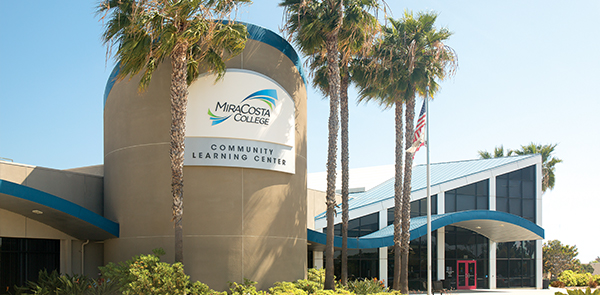
1831 Mission Avenue
Oceanside, CA 92058
760.795.8710
888.201.8480
View Map
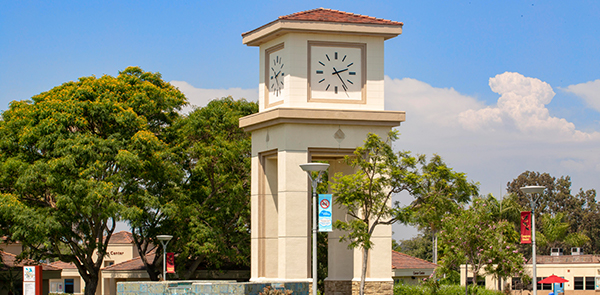
1 Barnard Drive
Oceanside, CA 92056
760.757.2121
888.201.8480
View Map
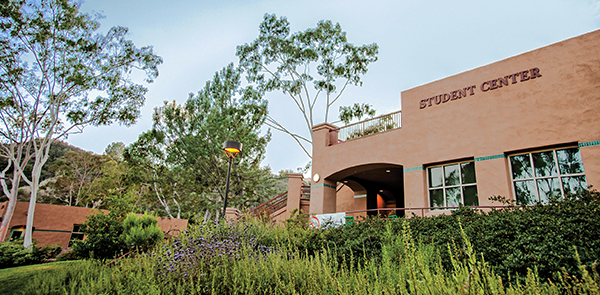
3333 Manchester Avenue
Cardiff, CA 92007
760.944.4449
888.201.8480
View Map
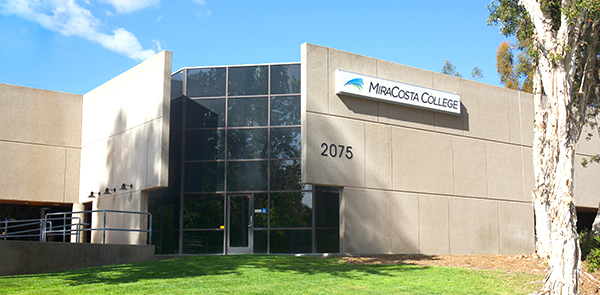
2075 Las Palmas Drive
Carlsbad, CA 92011
760.795.6820
888.201.8480
View Map
